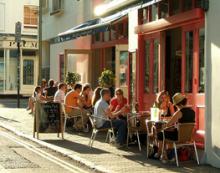Groupon has been so successful that it has accidentally crushed some small businesses who failed to set an appropriate cap on the number of coupons sold.
The idea behind Groupon is simple: users sign up for Groupon's mailing list. Every day they get an email with the day's deal.
Meanwhile, Groupon contracts with local restaurants to offer super-steep deals: a $100 gift certificate for $50 is a typical deal. Great, right? But not always!
Every time someone jumps on a Groupon deal, Groupon gets a cut, the users get an awesome deal, and business owners get traffic - both eyeballs on their website, and bodies in the seats.
Groupon has positioned itself as an interesting alternative to traditional print and television advertising, and in this sense it is ridiculously successful. If I were an advertising manager, I would be very worried about the success of Groupon.
The big lesson that Groupon's success teaches is that for independent restaurants, it's all about managing risk. Restaurant owners obviously need to learn to manage the risk of a wildly successful Groupon, as the story of Posies Cafe in Portland makes abundantly clear.
Put simply, Posies Café was utterly destroyed by their Groupon. They had an $8,000 shortfall in income that month (despite crazy mad traffic) and had to dip into their own accounts in order to make payroll. The owner of Posies Café has an incendiary blog post which is making the rounds.
I empathize with their situation, but the owner says that Groupon refuses to set a cap, which is - according to Groupon - completely untrue. She blames Groupon for the problem, but I'm really not sure what to think. Maybe she didn't know how to set a cap, or didn't think it would be necessary, or got a bad tech support rep when she contacted Groupon. I don't know.
In hindsight, I doubt that Posies Café would have spent $8,000 in advertising over three months. But that is basically what they did. The loss the business owner takes (in the above example, $50 on a $100 certificate) should be considered advertising. Extremely effective advertising.
The second way that risk plays into this is, the main reason Groupon is successful is that it mitigates risk for people wanting to try a new restaurant.
Are you willing to drop $100 at that new sushi place around the corner? Maybe, maybe not. Maybe you would prefer to go back to your favorite restaurant instead. Maybe, god help you, you would prefer to dine at Applebees.
Groupon basically gives you a chunk of money to try a new restaurant. (In our example, Groupon gives you $50.) Based on its success, I deduce that people want to try new restaurants, but they're reluctant to risk wasting money on a bad experience.
This has some interesting ramifications for restaurant owners who rely on basic advertising to get people in the door. Obviously, a newspaper or radio ad that just gets your name out there is not enough. You should definitely try Groupon… but be sure to set a prudent cap on the number of deals that can be sold!
Photo credit: Flickr/Dominc's pics
